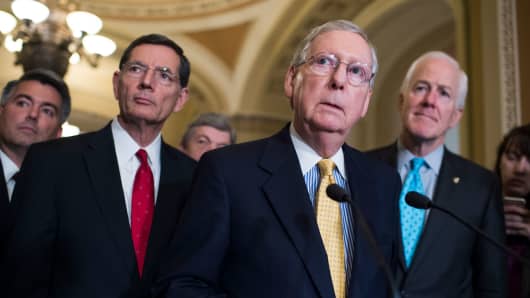President Trump's election created a golden opportunity for Republicans to nix the tax altogether. But fearing that outright repeal would run afoul of the Senate's budget rules, House Republicans chose to delay the tax until 2026.
The Senate should finish the job -- and repeal the tax permanently. The upper chamber is already on record in opposition to the Cadillac tax. Two years ago, 90 senators -- including 36 Democrats -- voted to repeal it.
The Cadillac tax commands opposition from Republicans and Democrats -- and unions and businesses -- because it will cost middle-class Americans big time.
The tax makes employer-sponsored insurance much more expensive (page 5). Employers can only respond by providing skimpier, more expensive benefits. Employees will increasingly find that their employer health plans limit access to doctors, hospitals, and certain high-priced drugs; reduce coverage for add-on benefits or dependents; or ratchet up deductibles, co-pays, co-insurance, and other forms of patient cost-sharing (under the sub-header How Could Plan Design Change?).
Employers can't wait until right before the Cadillac tax begins to make changes. Instead, they have to make changes gradually, whittling away at benefits and increasing employees' premiums. These changes will substantially degrade the quality of coverage available to American workers (employee impact - pg.7).
Put another way, because of the Cadillac tax, Republican lawmakers could one day suffer the same criticism as President Obama -- and be blamed for misleading Americans into believing that if they liked their plans, they'd be able to keep them.
Indeed, the Cadillac tax will hit more than 50 percent of the workforce within ten years of its implementation, according to a January study by the consulting firm Milliman (Executive Summary, p.1). That's 60 million Americans. These employees could see their benefits slashed by thousands of dollars -- while their salaries stay flat.
No wonder politicians keep putting off the day of reckoning.
Some economists theorize that workers might see their pre-tax wages increase as employers switch to cheaper plans. But if that happens, employees would also pay a lot more in taxes. The Cadillac tax could cost 12.1 million employees upwards of $1,000 in higher payroll and income taxes annually.
In fact, 80 percent of the revenue raised by the Cadillac tax is expected to come from workers paying more income and payroll taxes, according to the Joint Committee on Taxation and the Congressional Budget Office.
Senate leaders have stated that they expect to make significant changes to the House health reform bill. Their first should be outright repeal of the Cadillac tax. Such a move would go a long way toward protecting the employer-sponsored system that has provided affordable, quality coverage to more than half the population for decades.
Commentary by James Gelfand, the senior vice president for health policy at The ERISA Industry Committee (ERIC). ERIC is the only national association that advocates exclusively for large employers on health, retirement, and compensation public policies at the state, federal, and local levels.
For more insight from CNBC contributors, follow @CNBCopinion onTwitter.


